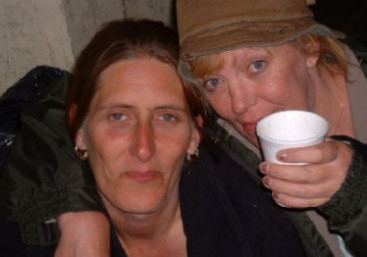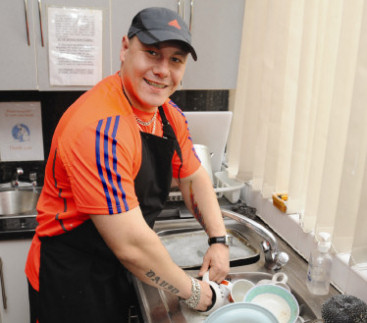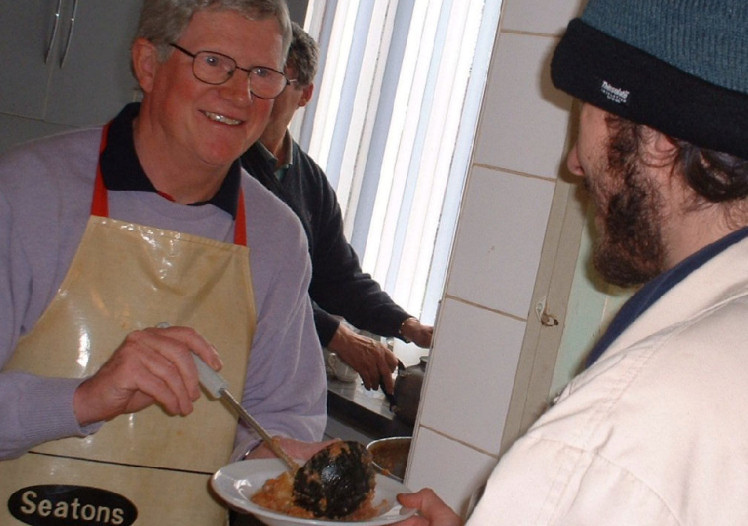
Rev John Hanvey is a Franciscan and part of the THOMAS Team
The THOMAS drop–in feeds 50 people a day. Over the years it has prepared hundreds of thousands of meals.
Remembering has been very much in the news recently, especially in commemorating the so called ‘Great War of 1914-1918. The artistically very beautiful and creative display of 888,246 ceramic poppies at the Tower of London drew hundreds of thousands and made us think and remember.
Often remembering is a sad affair. It’s usually about loss; mostly of someone we love. It can also be about the loss of our hopes and dreams, the loss of a job or the loss of youth and health. Remembering can be a happy thing as well, as we remember the past with amazing and wonderful moments that made the journey up to now worthwhile. Alan Bennett the Northern writer wrote a play called ‘Forty Years On’. Set in an English public school, the play is about the ending of the Great War in 1918 and the loss of innocence and a generation of young men. What this might have to do with a piece on our THOMAS Drop-in might be tenuous. But let me try anyway.
 First of all, like most of Bennett’s plays, our drop-in is in a northern setting and in one of the most deprived boroughs in the country. And the process of change over the Drop-in‘s last
twenty years, is just a microcosm of a far more reaching change in society that started to be noticed in particular following the ending of the Great War, but in fact had started much earlier culminating in what one Irish Bishop described recently as a great struggle, socially, politically, intellectually and profoundly cultural which has been fought and lost. He was referring to the
understanding and experience of Christian culture which once influenced the moral behaviour of Europe.
First of all, like most of Bennett’s plays, our drop-in is in a northern setting and in one of the most deprived boroughs in the country. And the process of change over the Drop-in‘s last
twenty years, is just a microcosm of a far more reaching change in society that started to be noticed in particular following the ending of the Great War, but in fact had started much earlier culminating in what one Irish Bishop described recently as a great struggle, socially, politically, intellectually and profoundly cultural which has been fought and lost. He was referring to the
understanding and experience of Christian culture which once influenced the moral behaviour of Europe.
So everything in the context of a vast sweep of history. We can only understand the present, including our daily involvement in the struggles of those who feel lost, maybe including ourselves sometime, if we remember our past. It was twenty years ago that I was first introduced to our Drop-in at THOMAS. Being a Franciscan friar, I was familiar with people on the edge. I was also familiar with the edge of things in my own life.
What has struck me most over these twenty years is the commitment and dedication of the volunteers who are here week in, week out providing great food and a friendly and welcoming atmosphere, often under difficult and challenging situations. We have had, and now have great volunteers and staff. The Drop-in has also touched so many in the wider community, even with the growth of food banks, we still get great support from schools and parish communities and from some of the local businesses who give us food and help provide some really good meals.
The sort of people who use our Drop-in has changed over the years. Many at the beginning were older people and many of them have died, but some of the younger ones from back then are still coming every day. But the general age group has become younger and reflects some of the painful issues in our society in general – isolation, loneliness, the loss of purpose and meaning and along with addiction problems there is an increasing number with dual diagnoses of mental health problems as well. This seems to be on the increase.
We are fortunate to have nurses on hand who provide advice and amazingly immediate help for those who need it. I’ve always thought that the poor in our society are often made to wait, as if they were men and women of no importance, not here and that to me has always been one of our best qualities.
 Looking back over twenty years, many of the people who came to us, have died in very distressing circumstances; overdoses, suicides and murder. These also are part of the memories
of the Drop-in. But there have also been some great transformations of lives and some people who were using the Drop-in now work with us, having turned their lives around. One person in particular has a great job helping others at the far end of the Yorkshire and happily married with a daughter.
Looking back over twenty years, many of the people who came to us, have died in very distressing circumstances; overdoses, suicides and murder. These also are part of the memories
of the Drop-in. But there have also been some great transformations of lives and some people who were using the Drop-in now work with us, having turned their lives around. One person in particular has a great job helping others at the far end of the Yorkshire and happily married with a daughter.
So the memories over twenty years are very much mixed. For me the past in general in our lives must never become a paradise, a Narnia place or a refuge from our present disappointments or troubles. But a brief look at our Drop-in history small as it is, is important because history very rarely gives an account of the forgotten or oppressed.
If anything the experience of the history of our Drop-in and that’s right up to the present moment, is an experience of acknowledging the reality of human pain. But of course our Christian spirituality is about consciously remembering suffering, death, and resurrection which challenges us to be with those who very often are left behind by society.
So twenty years on, our Drop-in is I hope still a beacon of hope and a challenge allowing us to be interrupted by the memory of so many people’s suffering over those years. I hope the Drop-in will always challenge the status quo, and also have the power to widen our imaginations, drawing us into deeper consciousness and compassion. The memories of the Drop-in I hope will always make us somewhat uncomfortable but always grateful.
